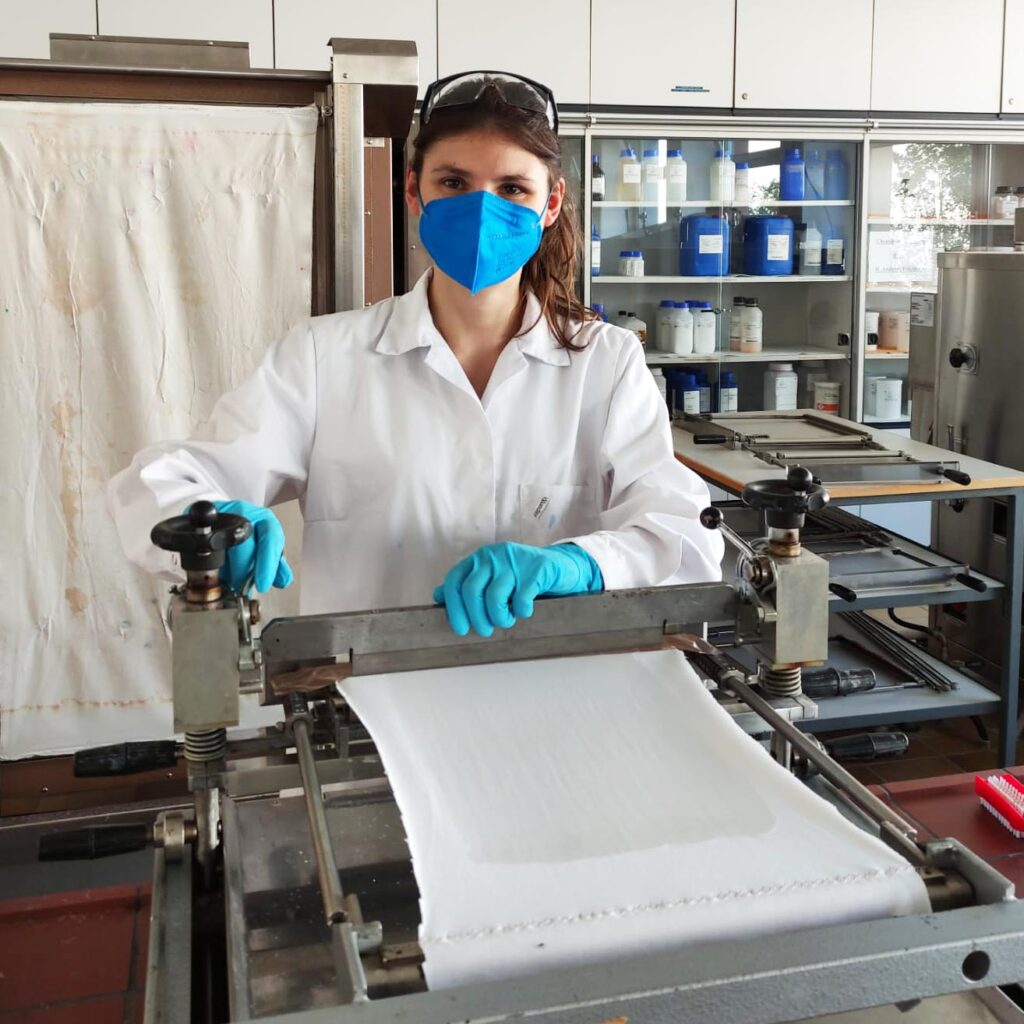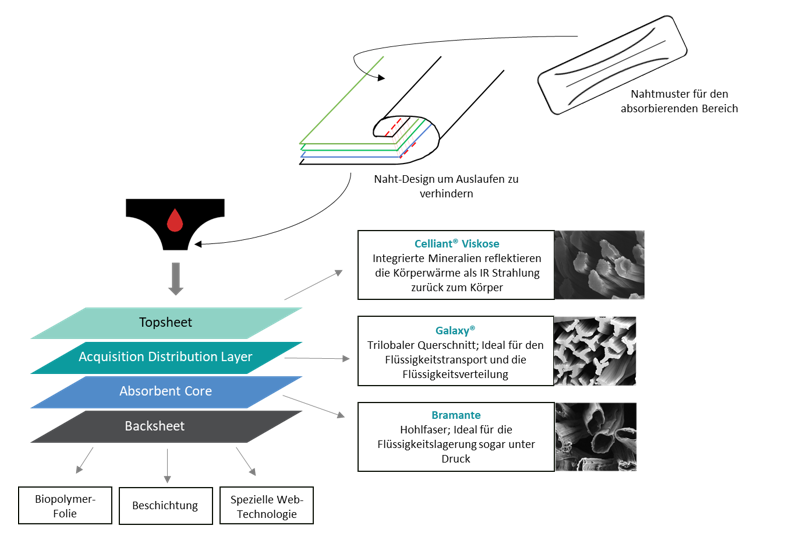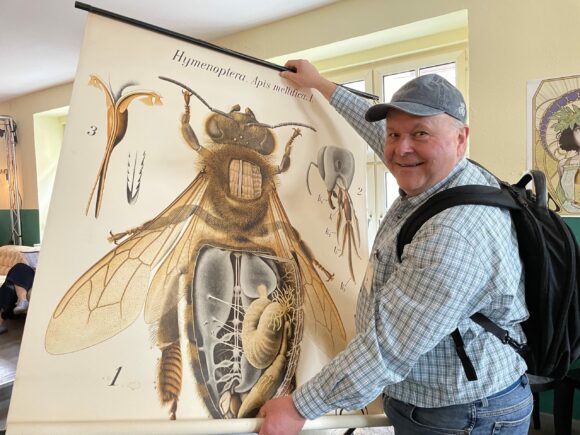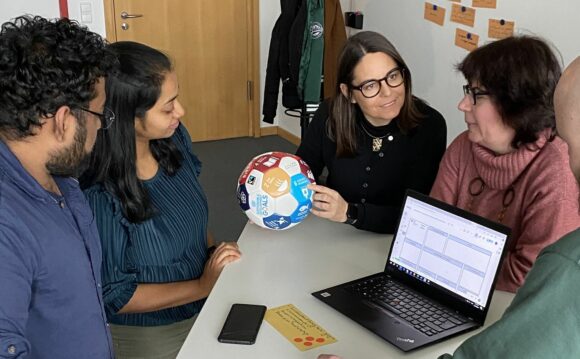The company Kelheim Fibres was recently nominated for the “Cellulose Fibre Innovation of the Year” award for its concept of a reusable menstrual underwear made of sustainable viscose special fibers. The developer behind it is Natalie Wunder, the first graduate of the “Sustainable Textiles” master’s program at Hof University of Applied Sciences.

Kelheim Fibres, a manufacturer of sustainable, functionalized cellulose fibers, aims to combine its expertise in sustainable absorbent disposable hygiene products and textile solutions. This should enable the creation of high-performance reusable period and diaper products. Natalie Wunder’s profile as a graduate of the “Sustainable Textiles” master’s program at Hof University of Applied Sciences was a perfect match for this challenge. Together with the company, she then developed a sustainable menstrual underwear that is reusable and biodegradable as part of her master’s thesis. In this way, the world of hygiene products is being made more sustainable in two ways: With fibers for biodegradable disposable products and with fibers for reusable, long-lasting products.
Sustainability is becoming increasingly important in all sectors. However, major deficits are still apparent in the textile industry in particular. Especially fast fashion, i.e. clothing that is produced and sold cheaply, generates considerable amounts of textile waste. This can only be recycled with difficulty. Moreover, when synthetic fibers are used, fossil resources are used as raw materials and the product is not biodegradable after its life cycle.
Nomination for textile industry innovation award
Things are different with textile engineer Natalie Wunder’s sustainable period wash, which she developed as part of her master’s thesis. “Our viscose fibers are wood-based, biodegradable and have, through our flexible technologies, certain functionalities. Central to our open innovation approach is close collaboration and mutual inspiration, including with research institutions. This allows us to develop the right product solutions for the challenges of today and tomorrow. This gave rise to the idea of sustainable period underwear, which Natalie Wunder has implemented excellently,” says Dr. Marina Crnoja-Cosic, Director New Business at Kelheim Fibres.
Only plant-based and biodegradable fibers are used for the menstrual underwear, which is why it makes an important contribution to a sustainable future in the field of reusable hygiene textiles. For this reason, the novel period briefs, along with five other projects, have been nominated for the Cellulose Fibre Innovation of the Year Award. The winner will be selected on February 2 and 3 at the “International Conference on Cellulose Fibres 2022” in Cologne. “I am very happy about this nomination and about being able to present the product to such a large audience,” says master’s graduate Natalie Wunder. And she continues
I basically hope for more sensitivity for the topic of menstruation and wish that women’s menstruation no longer remains a taboo subject. With my work, I would like to contribute to more attention being paid to the environmental influences associated with it.”
Natalie Wunder
Differences to existing menstrual underwear
The fact that Natalie Wunder is not alone in her desire is already evident from the ever-increasing selection of feminine hygiene products available in drugstores in recent years. “Every woman is different, and so their needs also differ,” says Crnoja-Cosic. “Our biodegradable hygiene fibers have long been the basis for convenient disposables – the fact that they now also combine sustainability and performance in reusable products is a big step for us. Women should have a choice.”
Easily reusable
The biggest difference from common disposable hygiene products is definitely reusability. But there are also major differences compared to the period panties already on the market, because none of the products combine sustainability, good performance and pleasant wearing comfort at the same time. Not so with Natalie Wunder’s sustainable menstrual underwear: the period panty is made up of four layers. The topsheet, the layer closest to the body, the ADL (Acquisition Distribution Layer), whose task is to transfer the fluid and distribute it optimally in the product, the absorbent core for fluid storage, and the waterproof backsheet, which serves as a moisture barrier.

The sustainable menstrual underwear uses special viscose fibers in the first three layers, which are specially tailored to the requirement profile of absorbent hygiene products through innovative functionalizations such as cross-sectional changes. The renewable raw material wood is used as the starting material for this. In addition, viscose is biodegradable. Approaches for sustainable and biodegradable solutions were also tested for the backsheet. Furthermore, a special seam design was developed, which does not use a continuous seam and thus offers higher protection against leakage.
Other advantages for women during their periods are that the panties are washable and can be reused. They also offer very good comfort and high performance
Natalie Wunder’s product absolutely meets the spirit of the times. She experienced excellent support in the company and was able to develop her ideas. Of course, that’s what I wish for all our students.”
Prof. Dr. Anett Matthäi, Vorsitzende der Prüfungkommission
By the way, with its bachelor’s degree programs in “Textile Design” and “Innovative Textiles” and its master’s degree program in “Sustainable Textiles,” Hof University of Applied Sciences is the only university in Bavaria that trains textile engineers.
What is the future of the concept?
Currently, the period slip is not yet available in stores. However, this year we are working on establishing a suitable textile value chain together with partners in order to bring a commercial product of sustainable menstrual underwear to the market. The technology will also be transferred to other applications, for example in the incontinence sector.







